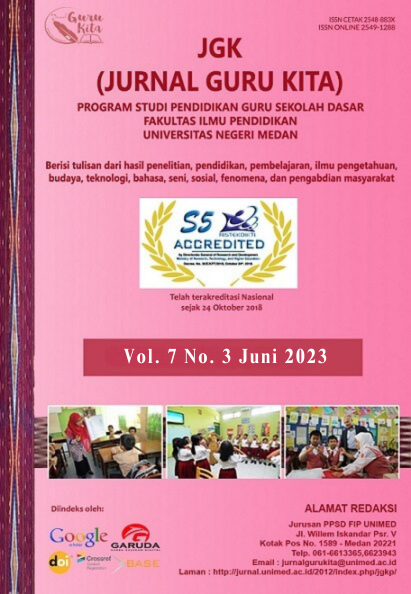PENGARUH PENGGUNAAN POWERT POINT PADA PELAJARAN BIOLOGI TENTANG KEANEKARAGAMAN HAYATI TERHADAP PENINGKATAN HASIL BELAJAR DAN AKTIFITAS SISWA DI KELAS X-MIA-1 MADRASAH ALIYAH NEGERI BINJAI SEMESTER GANJIL TAHUN PELAJARAN 2021/2022
DOI:
https://doi.org/10.24114/jgk.v7i3.47846Keywords:
Use of Power Point in Biology Lessons, BiodiversityAbstract
The Effect of Using Power Point in Biology Lessons About Biodiversity on Increasing Learning Outcomes and Student Activities in Class X-Mia-1 Madrasah Aliyah Negeri Binjai Odd Semester 2021/2022 Academic Year. This research is using a type of quantitative research with 36 respondents. Management of hypothesis testing data using product moment analysis and t test. The results showed that the Effect of Using Power Point in Biology Lessons About Biodiversity on Increasing Student Learning Outcomes in Class X-MIA-1 Madrasah Aliyah Negeri Binjai Odd Semester 2021/2022 Academic Year, this can be seen from the results of the calculation in the first cycle between the scores pre test with MID test scores obtained Produc Moment Correlation of 0.720 and t test of 6.396, in the second cycle between Block I test scores and Odd Semester test scores obtained Produc Moment Correlation of 0.856 while r table is 0.478, and t test is 10.204 greater from t table of 2.725. The Effect of Using Power Point in Biology Lessons About Biodiversity on Increasing Student Activity in Class X-MIA-1 Madrasah Aliyah Negeri Binjai Odd Semester 2021/2022 Academic Year, this can be seen from the results calculated in the first cycle between the pre-test questionnaire scores and the scores the MID test obtained a Produc Moment Correlation of 0.665, and the t test of 5.492 and between the post test questionnaire scores and the Odd Semester test scores obtained a Produc Moment Correlation of 0.857 while the r table was 0.478, and the t test was 10.278 which was greater than the t table of 2.725.References
Arikunto, Suharsimi, Penelitian Tindakan Kelas, Dalam Seminar Pendidikan di Medan
Baharuddin dan Esa Wahyuni, Teori Belajar dan Pembelajaran (Yogyakarta : Arruzman Media,2008),
Depdiknas, 2003, Kurikulum Berbasis Kompetensi, Jakarta : Depdiknas
Depdiknas, 2003, Undang-Undang Republik Indonesia Nomor 20 Tahun 2003 Tentang system Pendidikan Nasional, Jakarta : Depdiknas
Djati Sidi, Indra, 2001, Menuju Masyarakat Belajar, Jakarta : Paramadina
Departemen Pendidikan dan Kebudayaan, Kamus Besar Bahasa Indonesia (Jakarta:Balai Pustaka, cet. 4 ed. 3. 2007)
Direktorat Jenderal Kelembagaan Agama Islam, Metodologi Pendidikan Agama Islam (Jakarta: Departemen Agama RI, 2002),
Platinum, Biologi Untuk Kelas X SMA dan MA, 2012.
Iryanto, Siregar dkk, Model-Model Pembelajaran Yang Efektif, dalam Seminar Nasional Pendidikan, Medan, 2008.
Iskandar, Psikologi Pendidikan: Sebuah Orientasi Bari (Ciputat: Gaung Persada, 2009)
Muhibbinsyah, Psikologi Pendidikan dengan Pendekatan Baru (Bandung:Remaja Rosda Karya,2010)
Muhaimin, Pengembangan Kurikulum Pendidikan Agama Islam:di Sekolah, Madrasah dan Perguruan Tinggi (Jakarta: Raja Grafindo Persada, 2010)
Nana Sudjana, Dasar-dasar Proses Belajar Mengajar (Bandung:Sinar Baru Algesindo, 2010)
Downloads
Published
How to Cite
Issue
Section
License
Authors published with the JGK (Jurnal Guru Kita) agree to the following terms:
- Authors retain copyright and grant the journal the right of first publication with the work simultaneously licensed under a Creative Commons Attribution License (CC BY-SA 4.0) that allows others to share the work with an acknowledgment of the work's authorship and initial publication in this journal.
- Authors are able to enter into separate, additional contractual arrangements for the non-exclusive distribution of the journal's published version of the work (e.g., post it to an institutional repository or publish it in a book), with an acknowledgment of its initial publication in this journal.
- Authors are permitted and encouraged to post their work online (e.g., in institutional repositories or on their website) prior to and during the submission process, as it can lead to productive exchanges, as well as earlier and greater citation of published work. (See The Effect of Open Access)


























